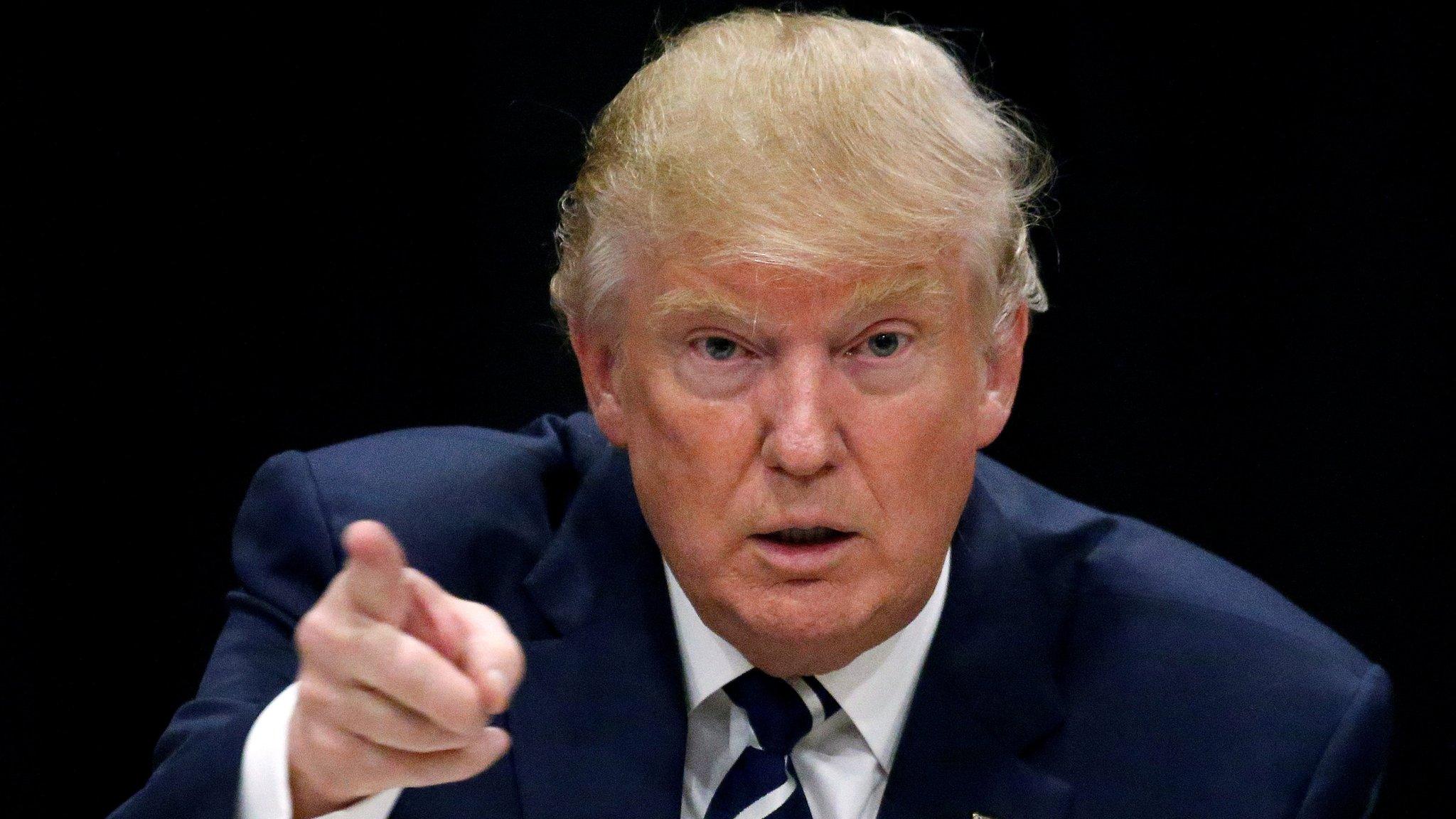How will the US media cover President Donald Trump?
- Published
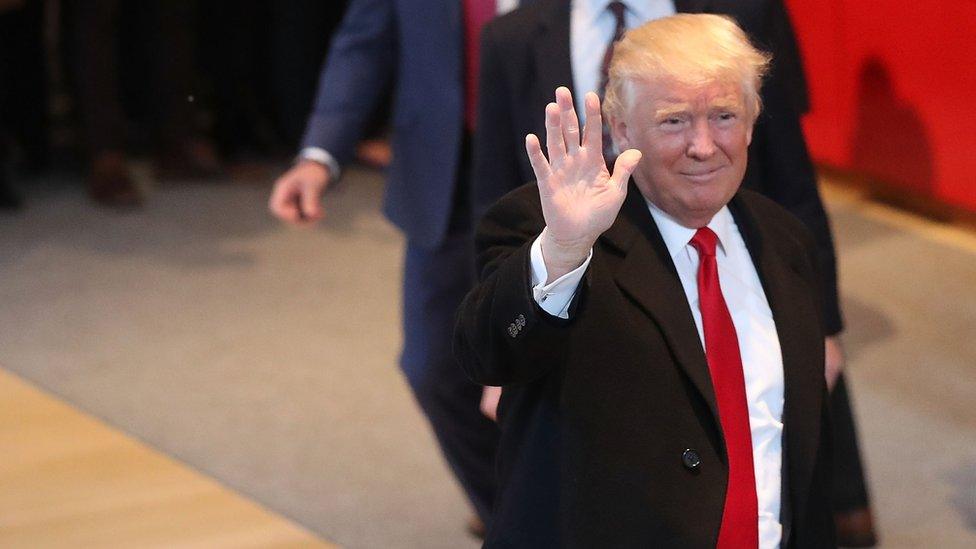
Trump, shown at the Times building, offered the publisher a deal
Donald Trump has attacked reporters at the New York Times and traditional media outlets and refuses to follow the Washington playbook.
The relationship between the mainstream media and Trump is tense - and may soon get even worse.
President-elect Trump said, external on Tuesday that whenever Arthur Sulzberger Jr, the publisher of the New York Times, thinks he's wrong about something, he should give Trump a call.
Trump made his suggestion during a meeting at the Times that he'd arranged, then cancelled, and then put back on the calendar.
Trump's offer revealed his managerial style: he likes to make deals - and seems eager to please.
Besides that, the exchange captured one of the fundamental truths about the relationship between the president-elect and the journalists who've traditionally covered the White House, reporters for organisations such as the New York Times, the Washington Post and CNN.
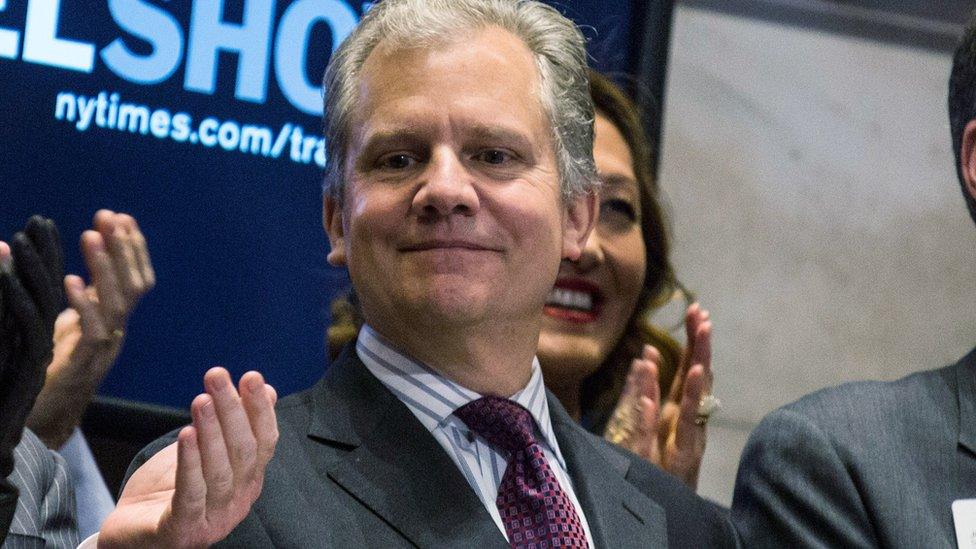
Trump said that Arthur Sulzberger Jr, shown in New York in 2015, should give him a call
Trump is willing to change things around to make people happy or when it suits him. Everything can be negotiated, including the scheduling of meetings and positions on issues.
During the campaign, for example, he said a wall would be built along the US-Mexico border. After the election, he said that part of it could be a fence.
He'd also demanded a criminal investigation of Hillary Clinton. He backed down after he was elected, saying: "I don't want to hurt the Clintons."
In contrast journalists at the mainstream organisations don't like last-minute schedule changes or sudden, unexpected shifts in policy. They also don't like feeling beholden to elected officials.
Reporters from non-traditional organisations such as Breitbart have applauded his efforts, however.
Breitbart has been described by some as a right-wing opinion and news outlet; others characterise it as savage, racist, and anti-Semitic.
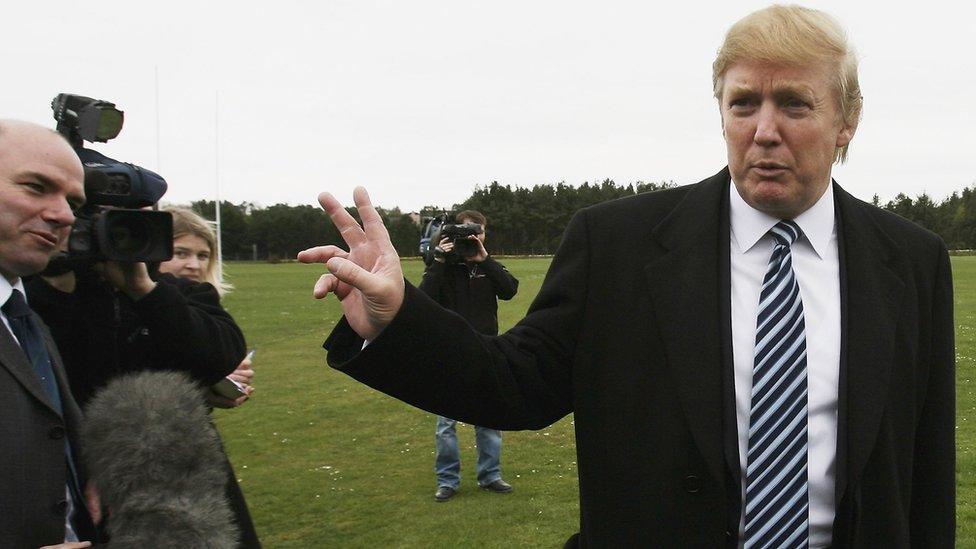
Trump, shown in Scotland in 2006, has a fraught relationship with journalists
Trump recently appointed Stephen Bannon, the chairman of Breitbart, as a senior counsellor at the White House.
Earlier this week TV executives and correspondents from mainstream organisations attended an off-the-record meeting at Trump Tower, planning to push for more access to the president-elect.
They hoped that they would be able to come to a better understanding about logistics and coverage of the White House.
Instead, Trump berated them for their biased coverage, as he portrayed it, and for using unflattering images of him.
After news of the meeting leaked out, media executives, speaking off the record with the New Yorker's David Remnick,, external unleashed a stream of expletives and said the president-elect doesn't seem to understand the First Amendment.
"This was unprecedented," said one person who was at the meeting. "Outrageous!"
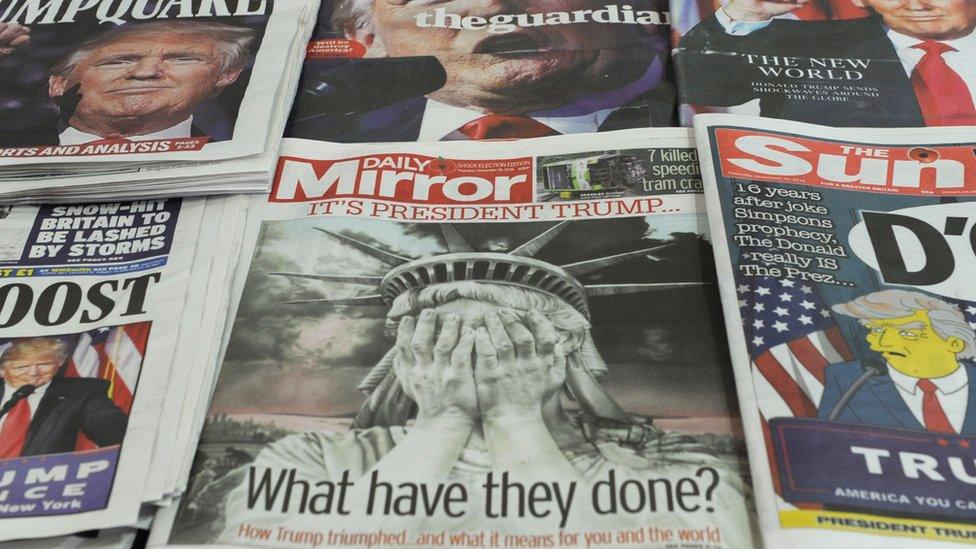
Journalists were stunned by Trump's victory at the polls
The relationship between the mainstream journalists and the president-elect has been fraught with misunderstandings - and laced with rage. Trump regularly lashes out at these reporters on social media and in other forums.
In turn, these journalists are mystified and angry.
As I've been travelling with the press corps during the transition, it's clear that many of them can't believe he won the election. They've also been frustrated by his abrupt shifts in policy and his decision-making process.
"How am I supposed to cover this?" one reporter said to me recently, looking at a laptop that he held open in front of him. He said he wasn't sure how to describe the president-elect's foreign policy since he'd changed his mind so often.
Like it or not, the president-elect and journalists are now stuck with each other. At this point - more than two weeks since Trump won the election - it's time for both sides to take stock.
The president-elect and many of the journalists who cover him may hold each other in mutual contempt, but they have a shared history.
Trump made his career through the media: he became famous in the 1980s because of his books and real-estate deals. He made a splash with The Apprentice in the 2000s.
He followed news coverage carefully, and the more of it the better. "He was obsessed with publicity," said Tony Schwartz, a journalist who later became his ghostwriter,, external "He didn't care what you wrote."
During the campaign, Trump was buoyed by wall-to-wall media coverage.
Yet he uses the major media outlets as a punching bag. He's targeted CNN, NBC and other organisations, calling them elitist.
The New York Times is, of course, the "failing" media organisation. He's accused the Washington Post's owner, Jeff Bezos,, external of trying to rip off the public through unfair tax schemes.
Trump demonises these media organisations, as well as their executives and reporters, and this way makes it hard for the media to be seen as impartial.
This puts mainstream journalists in a bad spot. Many of them feel that when it comes to covering Trump, they can't win. They feel offended by his actions - and resent the way that he acts in his job.
Meanwhile trust in the media has sunk to its lowest point, according to Gallup., external
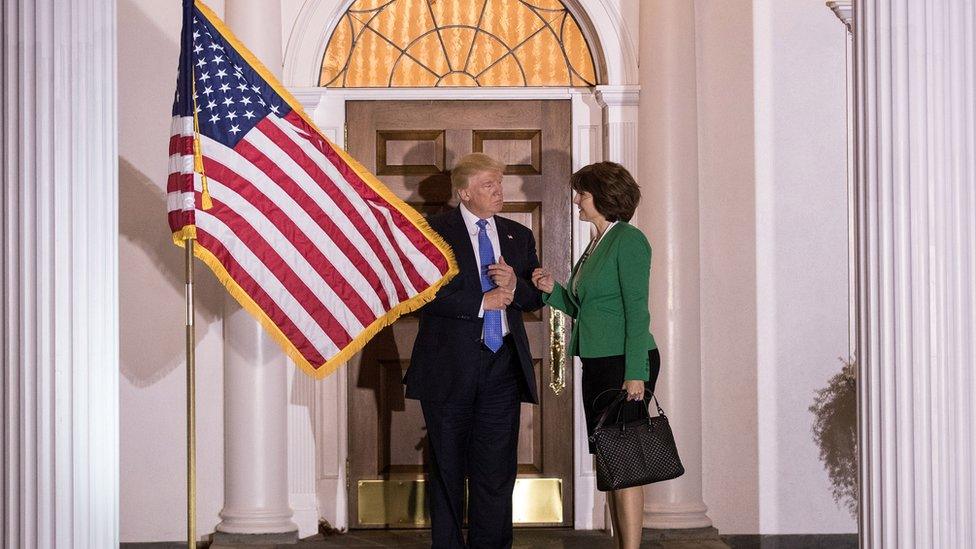
The president-elect, greeting Cathy McMorris Rodgers, avoided tough questions at his golf club
Trump knows that the media is widely disliked in many other parts of the US, and he's played to his audience.
At one point during the campaign, Trump was yelling at the media for not showing on camera how big his rallies were. Cameramen started filming people who were standing in the audience.
"And they'd flip them off," said James Ledbetter, the editor of Inc magazine and a media critic, describing the way Trump supporters gave journalists the middle finger.
Even after Trump won the election, he remained in attack mode.
On 13 November he tweeted: "The @nytimes states today that DJT believes 'more countries should acquire nuclear weapons.' How dishonest are they. I never said this!"
In fact he'd told Times reporters months earlier that he thought Japanese leaders would be better off if they had nuclear weapons. He was just as relentless with TV journalists.
On Monday he dressed them down during a meeting. His supporters seemed pleased with the way he acted: "TRUMP EATS PRESS," reported Breitbart.
Trump likes to address his audience directly, and since the election he's refused to hold a press conference. Instead he's bypassed the media, choosing to speak to his supporters through pre-packaged presentations.
On Monday, for example, he released a video, external about his new policies and his effort to assemble a cabinet.
None of this should come as a surprise, since he had a similar relationship with the media during the campaign.
Still as Keith Kelly, a New York Post media columnist, told me: "You kind of hope it will magically change once he arrives in the White House. But early signs post-election are still for a very strained relationship."
Still at a personal level he seems to want journalists to like him - and seeks their approval.
He invited reporters to visit his golf club in Bedminster, New Jersey. He'd been reluctant to let the pool of reporters accompany him during this travels, but he seems to have softened his views a bit.
He let me and other members the press pool travel in his motorcade on Sunday.
On that day at his golf club, he answered questions that were shouted operatically by my colleagues.
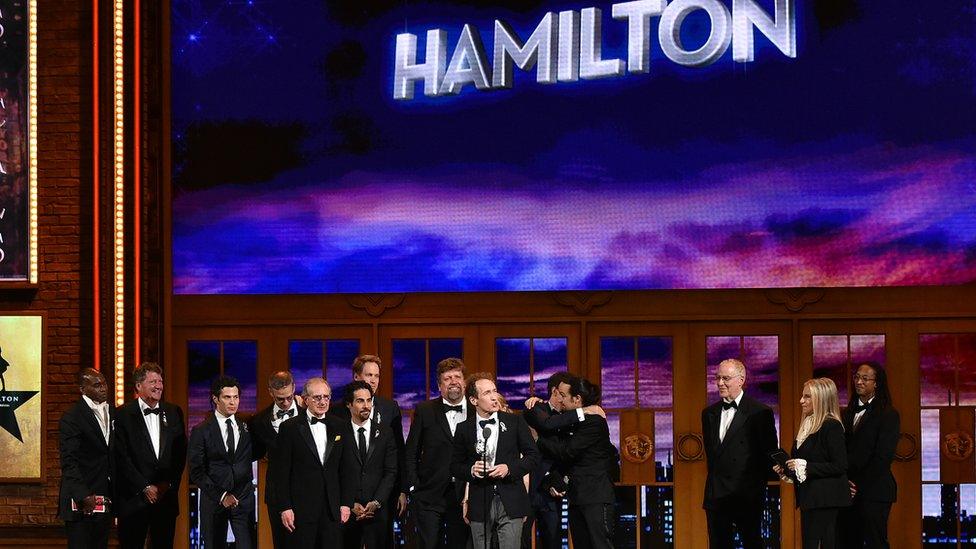
Trump told reporters he was unhappy with the cast of Hamilton (shown in the summer)
He chastised Hamilton cast members for asking Vice-President-elect Mike Pence to "uphold our American values". Their request, said Trump, was "very inappropriate".
He critiqued Saturday Night Live: "Not much of a show." When asked about Trump University litigation, though, he said nothing.
"Either he's a brilliant tactician who realises he can drop a bomb on Hamilton and change the subject," said Harvard's Matt Baum, who writes about media and politics. "Or he was just being impulsive."
Many White House correspondents don't think all his flip-flops have been bad, particularly his row back on the use of torture.
Trump told reporters, external on Monday he no longer believes in torture. He reversed a brutal stance he'd taken during the campaign.
After speaking with a retired general, he said, he realised that torture wouldn't "make the kind of a difference that a lot of people are thinking".
Still rapid-fire shifts in policy have repercussions. As president, he could create massive uncertainty, a situation that reporters will try - as best they can - to cover.
"This is going to be one of the darker and more dangerous things about the Trump presidency," said New York University's Jay Rosen.
"In authoritarian states, confusion is the baseline," he said. "You can never really tell what's going on, and the confusion is a political tool to keep people powerful."
Follow @Tara_Mckelvey, external
- Published22 November 2016
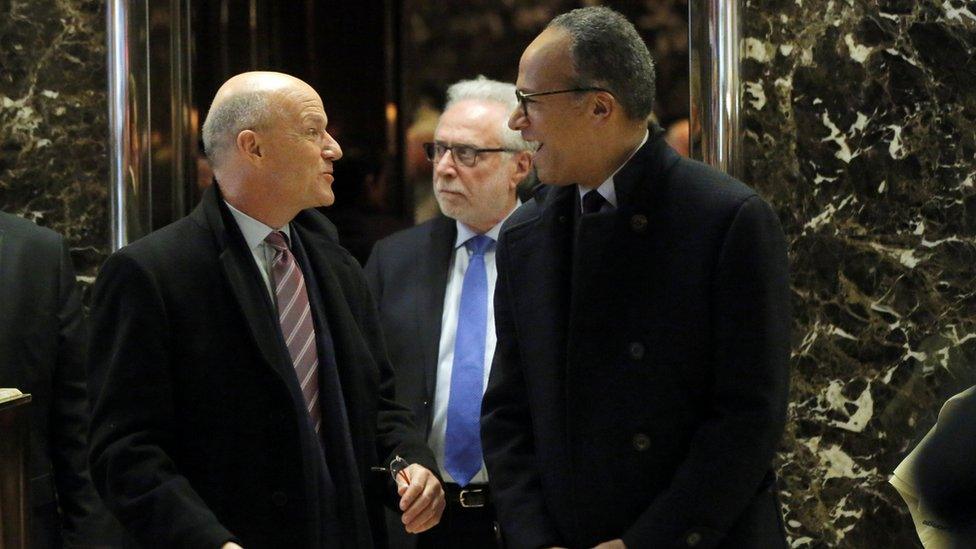
- Published14 November 2016
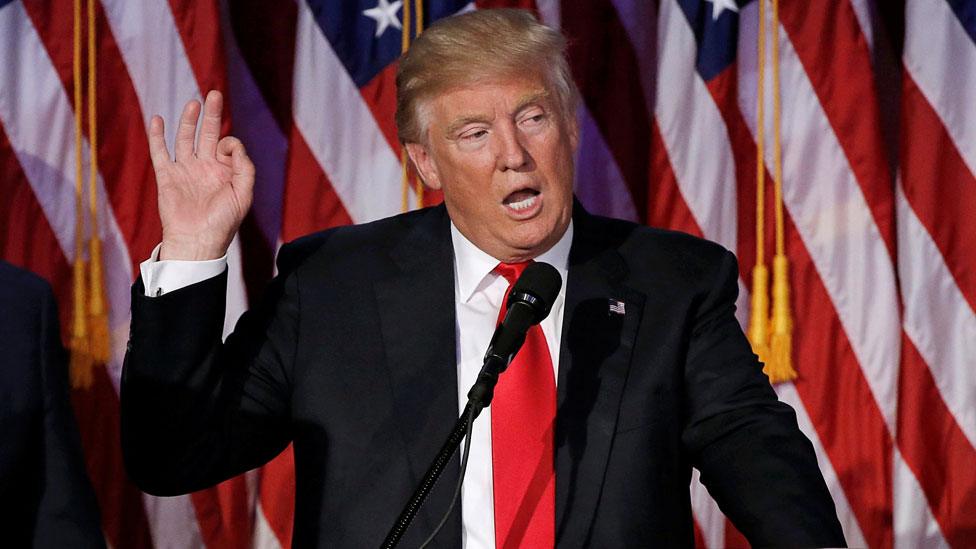
- Published23 November 2016
